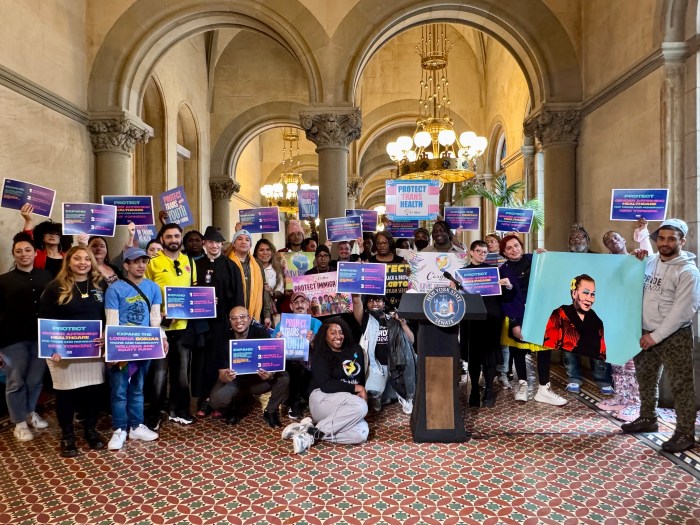During a recent discussion on MSNBC on E. Jean Carroll’s successful civil suit against Donald Trump, one panelist noted that it was Kathy Hochul who signed the New York law that allowed Carroll to sue Trump years after the earlier statute of limitations would have barred that action. While New York’s Democratic governor did sign that legislation last year, it was a coalition of advocacy groups and state legislators that moved the law.
“It’s sometimes lost in conversation that legislators and advocates had worked hard for years to get this bill passed,” said Brad Hoylman-Sigal, the state senator who led that coalition that enacted the Adult Survivors Act along with Assemblymember Linda Rosenthal, who represents portions of Hell’s Kitchen and the Upper West Side. Hoylman-Sigal represents parts of the Upper West Side, Hell’s Kitchen, and Chelsea and is openly gay.
As it did with Carroll, the statute gives survivors of sex assault who were 18 or older at the time the assault was committed a one-year window to file a civil lawsuit against the perpetrator. The law will expire in November of this year.
Previously, Hoylman-Sigal sponsored the Child Victims Act, which was first enacted in 2019 and then extended in 2020 due to COVID. That statute, which expired in 2021, allowed people who were sexually assaulted to file civil lawsuits against their perpetrators until the victim turned 55. Previously, the victim had to file such a suit when they were 23 or younger. The Child Victims Act produced “over 10,000” lawsuits, Hoylman-Sigal said. By comparison, there were 314,427 lawsuits filed in state Supreme Courts in 2022.
“We don’t have firm number yet on the Adult Survivors Act,” he said. “It’s approaching over 1,000 claims.”
In late 2022, Ben Crump, a civil rights attorney, and Adam Slater, a partner at Slater Slater Schulman LLP, a law firm, announced they would be filing over 750 lawsuits on behalf of women who were sexually assaulted when they were incarcerated in the Bayview Correctional Facility, a state prison at Bayview is at 11th Avenue and 20th Street in Manhattan, and other state prisons. They cited the Adult Survivors Act as making those lawsuits possible. Bayview was closed in 2012 after flooding from Hurricane Sandy.

“For decades, scores of women have claimed they were sexually assaulted in that facility,” Hoylman-Sigal said. “In terms of adult survivors, it seems to be the common element is an uneven power dynamic…The other commonality is that awareness has been heightened by the Me Too movement.”
By altering the statute of limitations for bringing civil lawsuits, the two laws made the thousands of lawsuits possible.
“Both of them point to the same need,” Hoylman-Sigal said. “The previous statutes of limitations were exceedingly short…We know that processing these events takes a great deal of time for victims.”
Statutes of limitation exist for good reasons. Memories can fade or change over time and records of abuse or that show the accused could not have committed the act can be lost or destroyed. But it is also true that survivors may be reluctant to come forward.
Carroll charged in a 2019 article in New York magazine that Trump sexually assaulted her in late 1995 or early 1996 in a Manhattan department store. Trump said the assault never happened and offered some ugly characterizations of Carroll. Represented by Roberta Kaplan, who represented Edie Windsor before the US Supreme Court in a 2013 case that overturned the federal Defense of Marriage Act, Carroll’s jury held Trump liable for sexual abuse and defamation and awarded Carroll $5 million in a May 9 verdict.
Prior to his election in 2016, Trump bragged about sexually assaulting women on a hot mike on Access Hollywood, an entertainment and celebrity TV show. At the time, his campaign asserted that Trump was merely engaging in male locker room banter. At least 25 women came forward to say that Trump had assaulted them, with some of those alleged assaults occurring as long ago as the 1970s.
“There’s a mantra among survivors, which is ‘Trauma takes time,’” Hoylman-Sigal said. “In both adult and child sexual abuse statues, the then timeframe was exceedingly short, in some cases, five years or shorter…Who in society has benefited from them except the people who inflicted the harm?”
Recovered memory cases, which received a great deal of attention in the 1980s and 1990s, do not appear to comprise a large number of the lawsuits filed under the Child Victims Act, though the state courts do not track such cases separately. Hoylman-Sigal said he was unaware of any cases.
“Certainly, you would need to have both expert testimony and contemporaneous accounts,” he said. Ultimately, it would be up to judges and juries to examine evidence.
“I think the rules of evidence are incredibly important,” Hoylman-Sigal said. “It’s up to a judge or a jury to sift through the evidence…I’ll say that there haven’t been any examples of false claims being filed.”
What is likely most controversial about both laws is that survivors must find an attorney to represent them. When the Child Victims Act became law, a number of law firms that specialize in representing large numbers of plaintiffs began aggressively advertising their services in New York. Those firms would likely be less interested in cases where the defendants have no assets.
“Most crimes of child sexual abuse occur in families,” Hoylman-Sigal said. “I would posit that most of those defendants are judgment proof in that they don’t have a lot of money…If you weren’t abused by a wealthy individual or a powerful institution protecting them, you may have difficulty seeking justice.”
Hoylman-Sigal points to Maryland, which recently passed its own Child Victims Act that eliminated the statute of limitations entirely for survivors filing civil lawsuits against their perpetrators. Making the features of New York’s two laws permanent should be considered by the State Legislature, Hoylman-Sigal said.
“You can’t underestimate the importance of putting institutions and persons of power on notice that they will be held accountable in civil court for these misdeeds,” he said. “A permanent window sends a message that these crimes are intolerable.”


































